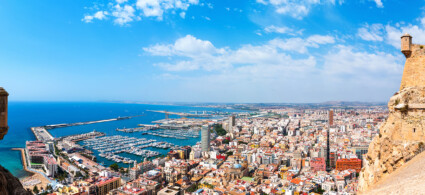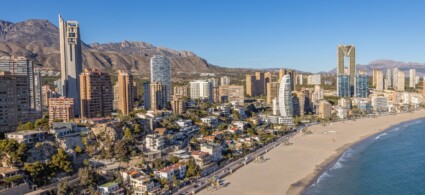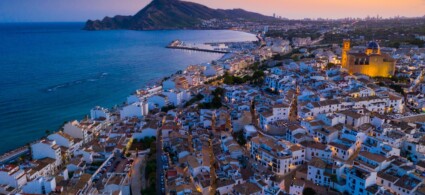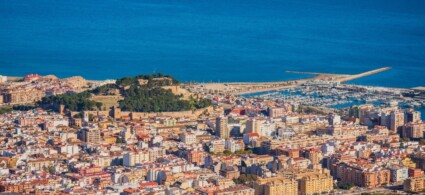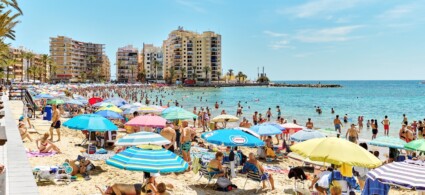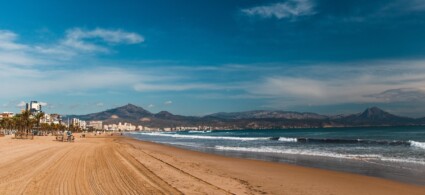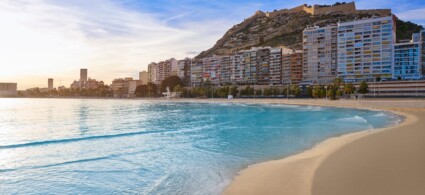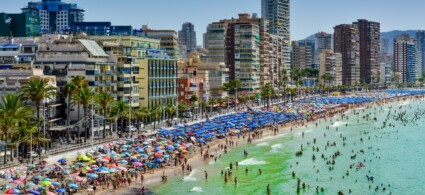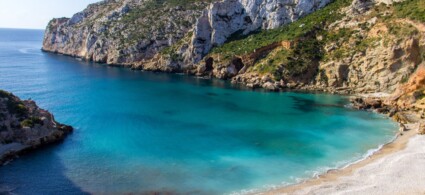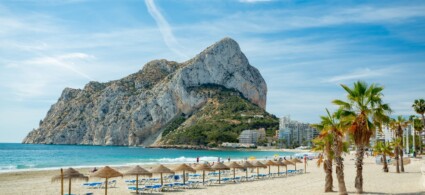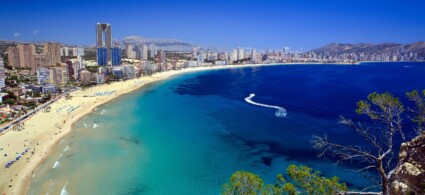

With more than 200 km of coastline, the Costa Blanca is a true paradise for sunbathers. From the well-equipped urban beaches to the most remote coves, the Costa Blanca’s beaches will allow you to spend relaxing days that will recharge your batteries.
Many beaches in the Alicante region can boast of having been awarded the Blue Flag and, in general, the beaches in this area are distinguished by the quantity and quality of services available, as well as a surprisingly beautiful natural setting (even in the case of urban beaches).
The typical image of the beaches in and around Alicante is that of a long sandy shore sloping gently down to calm, transparent waters, but there are also coves and rocky beaches with a wilder aspect.
Teeming with people, perfect for making new acquaintances, or semi-deserted, ideal for lone (sea) wolves, the Costa Blanca’s beaches remain in the hearts of anyone who visits them.
The Costa Blanca, with its 200 kilometres of Mediterranean coastline, offers a mosaic of enchanting locations, from lively coastal towns to picturesque inland villages, providing unique experiences in every season.
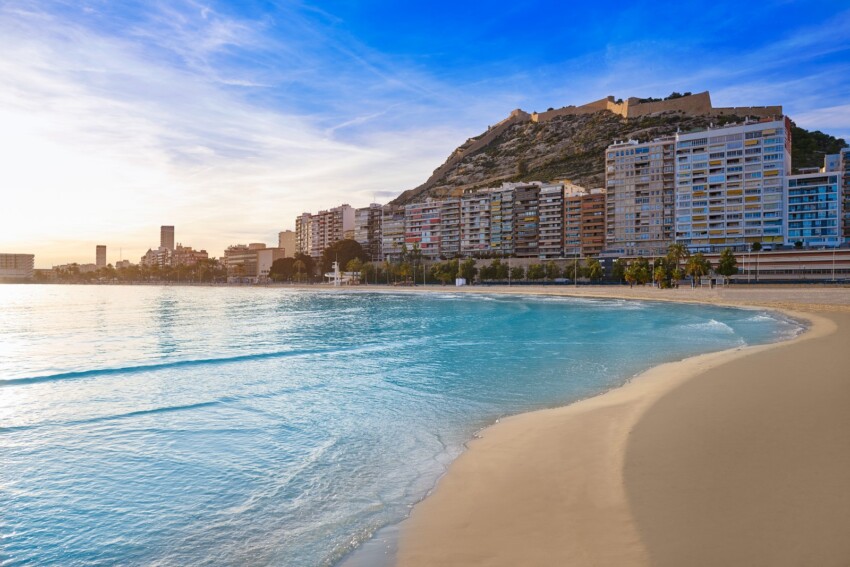
The capital of the Costa Blanca, Alicante, is dominated by the majestic Santa Barbara Castle, one of Spain’s largest medieval fortresses, reached by a lift carved into the rock. Its historical centre, with the characteristic Santa Cruz district, offers a labyrinth of picturesque narrow streets and flowery stairways, where traditional restaurants serve authentic Alicante tapas.
The Explanada de España, the famous promenade paved with 6 million marble tiles forming an undulating pattern, is the perfect place for evening strolls. The Central Market is a modernist building where you can discover local gastronomy, while the MACA (Museum of Contemporary Art) houses works by Dalí, Picasso and Miró. Urban beaches such as the 7 km-long San Juan offer excellent bathing facilities.
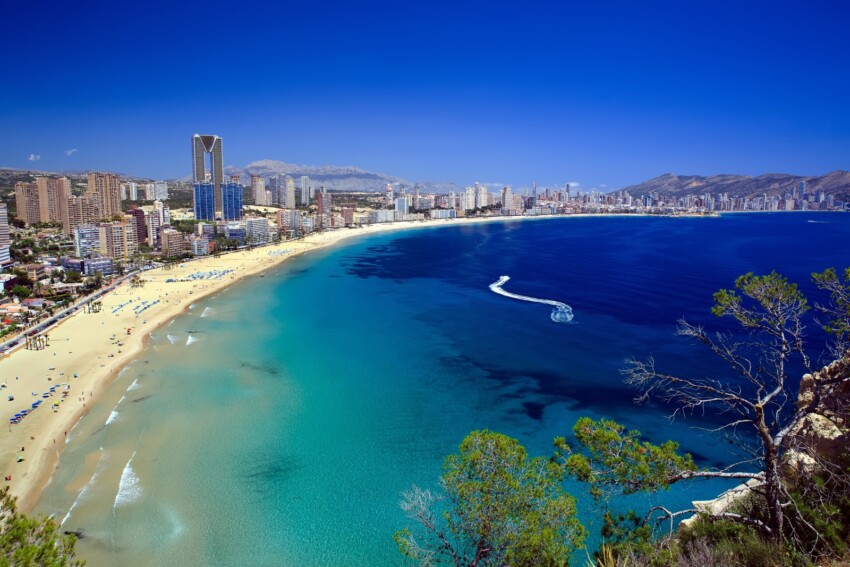
The Manhattan of the Mediterranean is famous for its skyscrapers and long, golden sandy beaches. Playa de Levante and Playa de Poniente, both awarded Blue Flag status, are among the most beautiful urban beaches in Spain, with crystal-clear waters and lively maritime promenades. The Terra Mítica theme park transports visitors to ancient Rome and Greece, while the Aqualandia water park and Mundomar offer fun for the whole family.
The nightlife is legendary, with clubs for all tastes in Rincon de Loix. Benidorm Island offers snorkelling opportunities, while the Mirador de la Punta del Canfali provides spectacular views of the bay. Scenic hikes can be made in the Sierra Helada Natural Park.
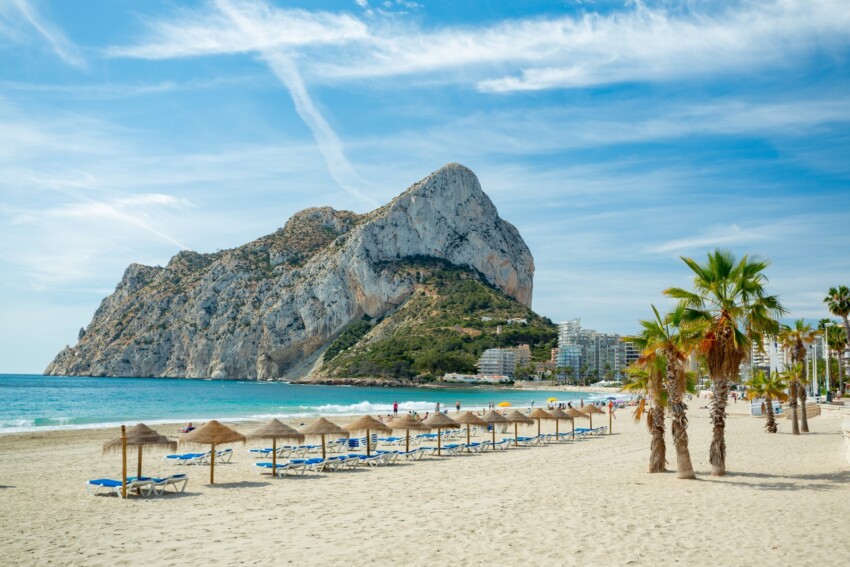
Dominated by the iconic Peñón de Ifach, a 332-metre-high limestone rock and symbol of the Costa Blanca, Calpe offers a perfect mix of history and nature. The ascent to the Peñón, although challenging, offers breathtaking views of the entire coastline. Its salt marshes are a natural habitat for pink flamingos and other migratory bird species, while the historical centre preserves walls and archaeological remains from Roman times, including the Queen’s Baths.
The main beaches, Arenal-Bol and La Fossa, are separated by the Peñón and offer crystal-clear waters. The fishing harbour is the ideal place to enjoy fresh fish, while the Paseo Marítimo Infanta Elena offers a pleasant seaside promenade.

Considered one of the most beautiful resorts on the coast, Altea enchants with its historic centre of whitewashed houses and the distinctive church of Our Lady of Consuelo with its blue domes dominating the view. The narrow cobbled streets of Portal Vell are home to craft shops, art galleries and traditional restaurants.
The promenade is dotted with seafood restaurants and trendy cafés. The Club Nautico offers excellent water sports facilities, while the Tuesday Market is famous throughout the region. The University of Fine Arts attracts artists from all over Europe, creating a bohemian atmosphere. Playa de la Roda and Playa de Cap Blanc offer calm waters and spectacular views of the Mediterranean.
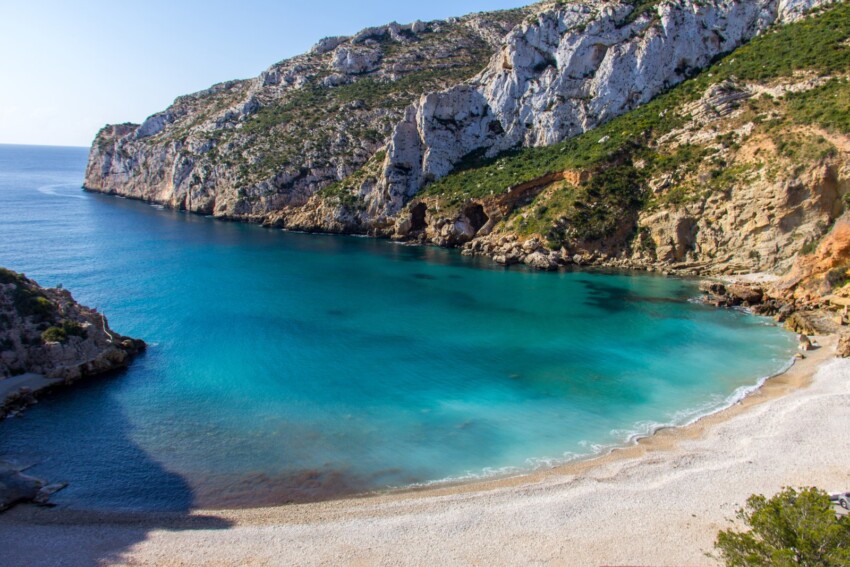
Divided between the port, the beach and the historic centre, Jávea (Xàbia) offers some of the most beautiful coves on the coast. The Cala Granadella, awarded as one of the most beautiful beaches in Spain, and the Cala del Portitxol with its turquoise waters are true natural gems. The Cabo de San Antonio offers spectacular views of the coast and is home to a marine reserve.
The historical centre preserves Gothic buildings such as the Church of San Bartolomé and the Municipal Market. The Port is the ideal place to enjoy fresh fish, while the Arenal offers a lively summer nightlife. The Monastery de la Plana and the old windmills bear witness to the city’s rich historical heritage.
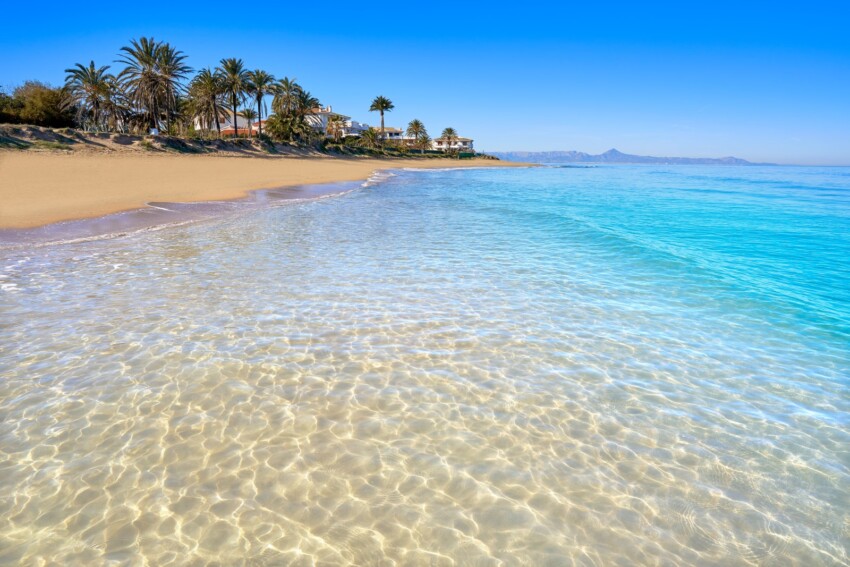
An important marina, Denia boasts an 11th century castle that dominates the city, offering an archaeological museum and panoramic views. Its 20 km of coastline alternates between the sandy Playa Las Marinas and the rocky cliffs of Las Rotas, ideal for snorkelling. The Montgó Natural Park, with its characteristic elephant shape, offers excellent hiking opportunities and is home to endemic species.
the old town has modernist buildings and the characteristic Barrio Les Roques. The port connects the city with Ibiza and Mallorca, while the Mercado Municipal is famous for its fresh produce. The city is also known as the gastronomic capital of the Valencian Community, with Michelin-starred restaurants.

Famous for its colourful houses overlooking the sea, a legacy from the time when they helped fishermen recognise the harbour in the fog, and for being home to the historic Valor chocolate factory, which offers free guided tours. The Fortified Church of the Assumption dominates the old town, while the Chocolate Museum tells the story of this centuries-old tradition.
Its beaches, including Playa Centro and Playa Paraíso, are among the least crowded on the Costa Blanca. The fish auction market and the fishing harbour keep maritime traditions alive, while the Archaeological Park of Torre la Cruz preserves Roman remains.

An ancient fishing village transformed into an elegant tourist resort, Moraira has retained its traditional character. The Playa de l’Ampolla, with its fine sand, and the 18th century castle are the main attractions. The Porto Sportivo is one of the most beautiful in the Mediterranean, while coves such as El Portet offer crystal-clear waters.
the weekly market is famous for local produce, and the surrounding vineyards produce the prized Moscatel wine. The Torre Vigía del Cap d’Or offers panoramic views, while the harbour restaurants serve excellent fresh fish. The area is also known for scuba diving around Descubridor Island.

Torrevieja is famous for its pink and green lagoons that form the La Mata and Torrevieja Lagoons Natural Park, a unique ecosystem where salt is produced and flamingos can be observed. Urban beaches such as Los Náufragos and La Mata stretch for kilometres.
The Sea and Salt Museum tells the history of the city, while the historic Casino is an example of modernist architecture. The summer night market and promenade offer evening entertainment, and the Park of Nations houses a miniature replica of Europe.
In the following map you can see the location of the main places of interest mentioned in this article.

Discovering the most beautiful beaches and coves is one of the most exciting things to do during a holiday on the Costa Blanca. However, if you don’t want to waste time ‘trying’, head straight for the beaches we recommend!
Here is a list of the most beautiful beaches on the Costa Blanca, grouped by zone or type:
The Costa Blanca is a superbly developed tourist region, so whatever your destination, you will find a very wide range of places to sleep ready and waiting for you. It’s all about choosing your preferred sleeping area, depending on the type of holiday you want to take.
Choose Benidorm if you love excess and nightlife, but also if you love wide, amenity-filled beaches, choose the more chic Altea or Denia for a relaxing holiday, and don’t underestimate the beautiful Alicante, which cleverly combines a lively city life with the relaxed pace of a beach holiday.
The Costa Blanca is easily reached thanks to Alicante International Airport, located within the municipality of Elche, or Elx in Valencian. The airport receives more than 15 million passengers per year, mostly from Northern Europe and the United Kingdom. However, there are direct connections to the rest of Europe, mainly operated by Ryanair.
If the area from which you are departing has no flights to Alicante, you can get to the Costa Blanca comfortably by landing in Valencia, and then continuing by rental car or public transport: Valencia and Alicante are connected by regional and intercity trains and also by buses operated by the ALSA company.
